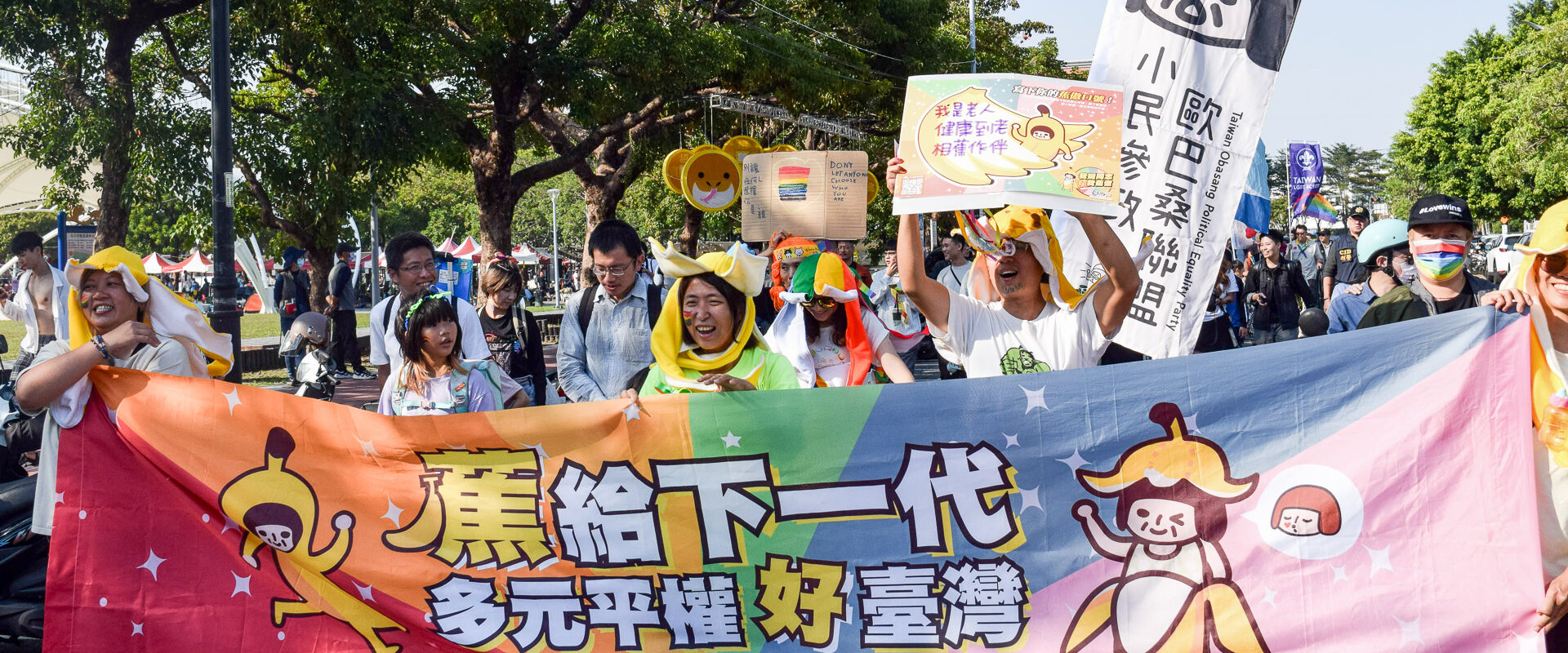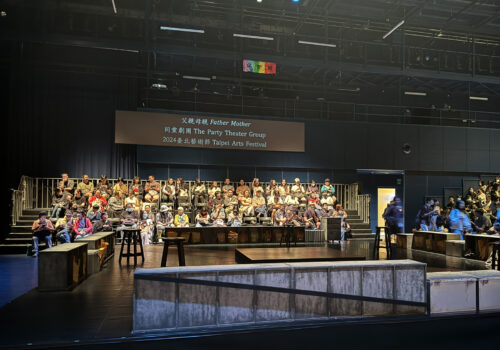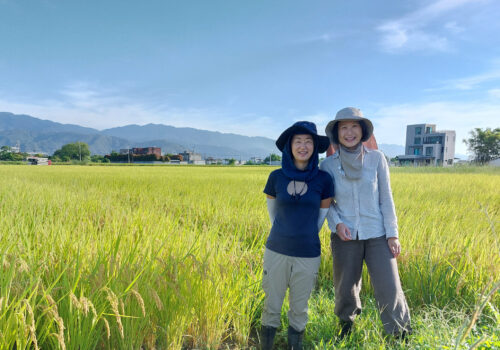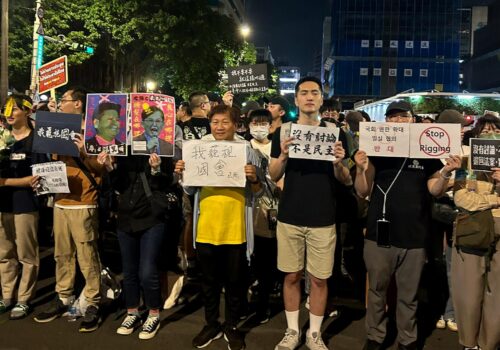YUNLIN, Taiwan — Just before the 2024 Pride parade snaked past this largely rural county’s Public Health Bureau, Liu Chin-an took the microphone and faced the few thousand LGBTQ+ people and allies politely marching behind the parade van. From afar, he looked like your average university student, dressed down in gray Nike sweatpants and the official event shirt—a white tee with a cartoon Shiba Inu dog poking out of a rainbow-lined shirt pocket. The late November wind tussled the Pride lead coordinator’s hair, parted in the middle, with a few strands standing on their own whenever he swept them away from his face. But as Liu pointed at the government building complex, his casual appearance took on an impish boldness. From a few paces away, I could see him smile mischievously behind the microphone.
“A lot of people have heard me say this already but I’m going to say it again anyway,” Liu said. “The Yunlin county government repeatedly refused to give us a venue for this event, denying our applications for what we now know were false reasons. We’re marching today to prove they can’t stop us from organizing Pride and that LGBTQ+ voices must be respected!”
His voice rising to shrill shouts at the end of each sentence, Liu used every last bit of oxygen to exorcise his months-long vendetta against the bureau. I later learned from him that as early as May, the Pride organizing committee—which includes members of the Yunlin County Education and Cultural Development Association (YECA) and most of whom are university students—started applying for permits for two locations in Douliu, the county’s capital, a two-and-a-half-hour drive south of Taipei.
In response to their first-choice location at Douliu Riverside Arts Park, the authorities expressed concerns that Pride would interfere with ongoing renovations. However, the government later hosted Yunlin Young Power, a free concert and student music competition attracting nearly 10,000 people at that very location the evening before Pride.
The team’s second application, for nearby Pengshu Park, was again rejected on the basis that the government had already reserved the space for another event. But when the Pride organizers requested to see the event plan, “it was obvious it had been hastily slapped together. There wasn’t even a theme,” Liu said in an interview, recounting the experience with a composure that far exceeded his 19 years of age.
“The real reason for these rejections was very clear to us,” he added matter-of-factly. “They can’t say it aloud, but the Douliu City Office in Yunlin simply does not support gender equity movements.” Until November 3—with the event set for November 30—when Liu and his team finally received approval, the future of the 2024 Yunlin Pride was in limbo.
On the parade van, just as he handed the megaphone back to the emcees, Liu directed one last epithet toward the local government compound across the street: “You bastards!”
As his voice trailed into laughter, the crowd rose in applause—some of the rowdiest of the entire five-hour event. As we passed by the government buildings, some participants waved their flags more vigorously; others unabashedly raised their middle fingers. Still others power-posed in front of the Legislative Council, hands defiantly on their hips, as though to manifest a day when they, too, could sit at those tables.
At first, I was taken aback by Liu’s casual-seeming bravery. I had seen Taiwanese people curse and insult politicians in the past, including during the popular pro-democracy Bluebird Movement last year. But in the specific context of Pride, I realized that perhaps I had grown used to parades where the cheers of LGBTQ+ people compete with or are even subsumed by the bass lines of dance music. I had begun to view Pride celebrations as worthy parties but vacuous in their political messaging.
But here, in the mostly rural plains of Yunlin, a few thousand people marched through the streets of the county’s sole city with a clear demand to be fully seen. No music blasted from mega-speakers—just a few more curses from Liu and speeches from representatives of participating organizations. Here, in the only Pride celebration held in 2024 outside Taiwan’s six major cities, a man holding another’s hand is still enough to merit a soft cheer from supporters.
Although Taiwan has been heralded as a regional beacon of LGBTQ+ rights, especially when it became the first Asian country to legalize same-sex marriage in 2019, marginalized communities under the LGBTQ+ umbrella continue to fight for social acceptance and legal rights. Still, those living in largely non-urban, non-industrialized counties like Yunlin are rarely the focus of advocacy campaigns.
When I heard that Yunlin—known for its plethora of religious sites and being Taiwan’s poorest county with a rapidly aging population—was hosting its second Pride celebration ever, the first in four years, I was immediately intrigued.
As someone who has mostly experienced only big-city Pride in the aftermath of same-sex-marriage legalization in the United States and Taiwan, I became curious about what Yunlin Pride could tell me about this county of 660,000 people where most of my Taiwanese friends, gay or straight, have never been—and also what it could teach about the value of Pride as a strategy for advocacy and demonstration of hope.
* * *
Around 8 p.m. on my first night in Douliu, Teresa Teng’s classic ballad “The Moon Represents My Heart” hummed from speakers at central Douliu Circle, where a brutalist water foundation produced lights and water curtains of moons and hearts in synch with the lyrics. Promoted as a key tourist attraction, the traffic circle is just one block south of the train station, with hotels, karaoke bars and bubble tea shops lining its perimeter.
Yet on this warm November evening, the programmed light show had an audience of one, as I stopped by a 7-Eleven on my way back to my hotel. I was bewildered by both how coordinated the light, music and water were and the lack of anyone to appreciate them. I could easily count the number of cars that made their way around the circle during the song’s four-minute run.
Beyond the Walmart-parking-lot-sized night markets alive with sizzle and smoke and morning wet markets where locals chat with grandmotherly vendors hunched over their streetside picnic blankets strewn with vegetables, Yunlin exudes spectral sleepiness. The three cities and urban townships I visited—Douliu, Huwei and Beigang—all rise from the flat Chianan Plain like walled oases. Although markedly denser in concrete than the surrounding farmland, their broad, quiet streets offer the same kind of pastoral peace. People stop at one another’s stalls and doorsteps from neighborly care and because social interaction here can be a precious rarity.
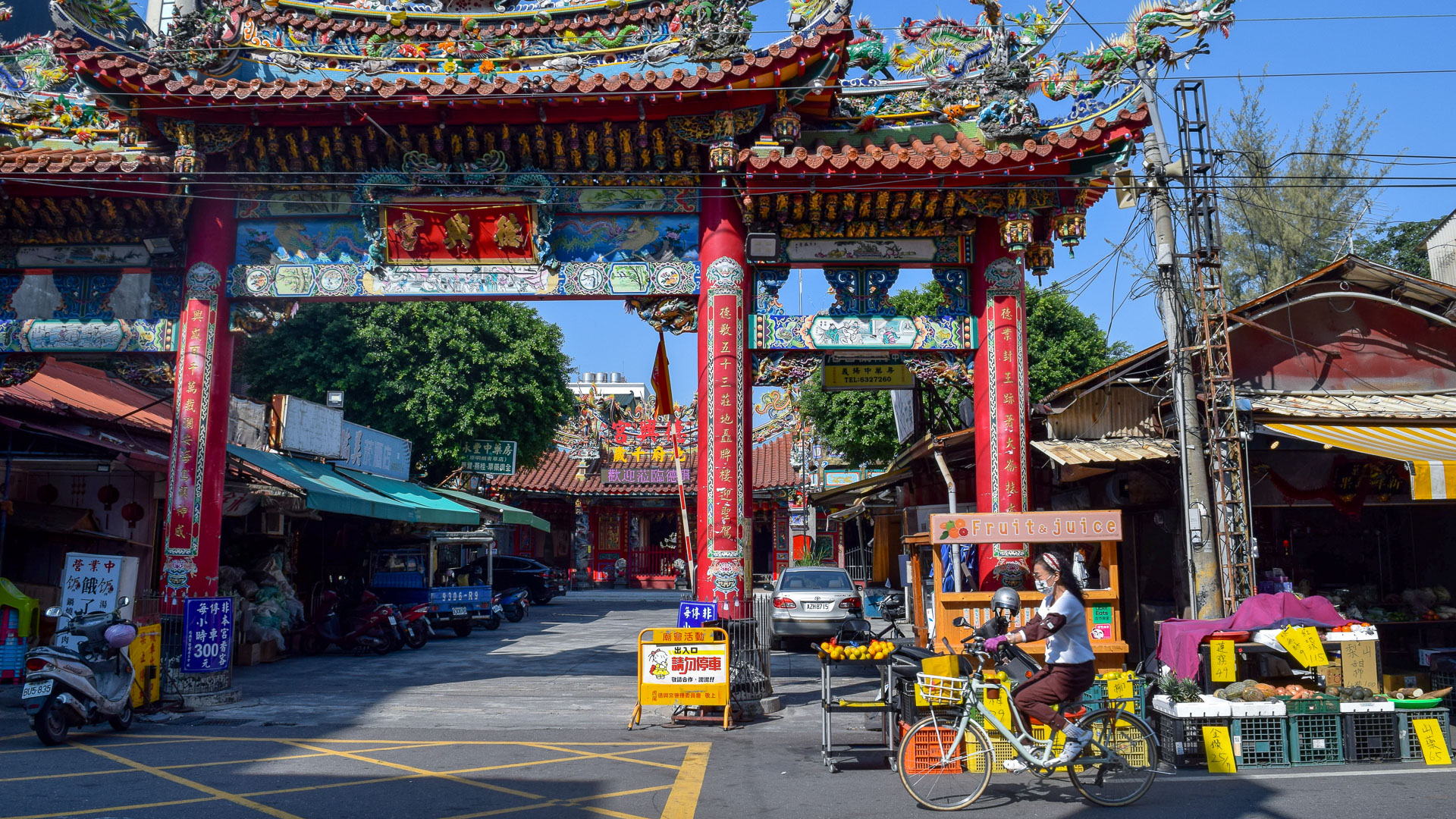
Yunlin’s population has steadily decreased over the last few decades as other regions have grasped more tightly onto Taiwan’s industrial and technological progress. Data from Yunlin’s Interior Ministry indicate that in 2023, the natural population growth rate was -7 percent, with over 5,000 more deaths than births in the county. Among the critical working-age demographic of between 20 and 44, the net migration rate in 2023 was -8.93 percent, with many of Yunlin’s young adults choosing life in Taiwan’s major cities over its “agricultural capital”—a name that county magistrate Chang Li-shan once wrote “hangs over Yunlin like a ghost… and seriously limits the imagination of all walks of life on future development possibilities.” Even at NFU, one of two universities in Yunlin, over 70 percent of students grew up outside the county, with many going home or otherwise leaving Yunlin on weekends. By contrast, just over 20 percent of the population is over 65, meaning that Yunlin qualifies as a super-aged society.
In its annual “Sustainable and Happy Cities” ranking last year, Commonwealth Magazine named Yunlin the second-least-competitive county in Taiwan, based on a combination of economic, political and social metrics.
“Other than taking care of my parents and grandparents, I’m not sure what keeps me in Yunlin,” one student at National Formosa University (NFU), located in Yunlin’s Huwei Township, told me.
Considering these demographic trends, perhaps it isn’t surprising that “the LGBTQ+ experience in Yunlin is a lonely one,” as Liu told me. As I searched for LGBTQ+ narratives in Yunlin on social media, one phrase turned up repeatedly: Yunlin is a gay desert. On Threads, Instagram’s micro-blogging platform, many (mostly gay male) netizens expressed surprise when others commented “I’m also here!” on their posts. When I opened Grindr, the geolocated distances between the headless torsos grew exponentially, stretching into neighboring Changhua and Chiayi counties. There is one gay bar in Douliu, but most Pride attendees did not even know of its existence. No LGBTQ+ community organization offers regular, on-the-ground services in Yunlin, with Taichung GDI Association (about 70 kilometers away) and Taiwan AIDS Foundation’s Chiayi Branch (40 kilometers away) offering occasional anonymous HIV testing appointments.
“After living eight years in Beigang [in southern Yunlin], I still don’t think I’ve fully integrated into the community here,” An Zi-jie, one of two emcees for last year’s Yunlin Pride, told me. He has lived many lives across his storied career in the Taiwanese entertainment industry, having worked as a radio host, event emcee and recording artist in cities like Taipei and Kaohsiung. On the day of Pride, An exuded urban exuberance, dressed in a rainbow, tie-dyed tee-shirt and pink trousers. At one point in the middle of the parade, he complimented my corseted tank top, and I watched as he approached other participants with easy confidence, his watchful, almond eyes creasing into a smile each time.
“Even 20 years ago, we gays found community and camaraderie with one another,” An said, fondly reminiscing about his life in Taipei. “We celebrated one another’s wins. We drowned one another’s sorrows in karaoke bars until the morning.”
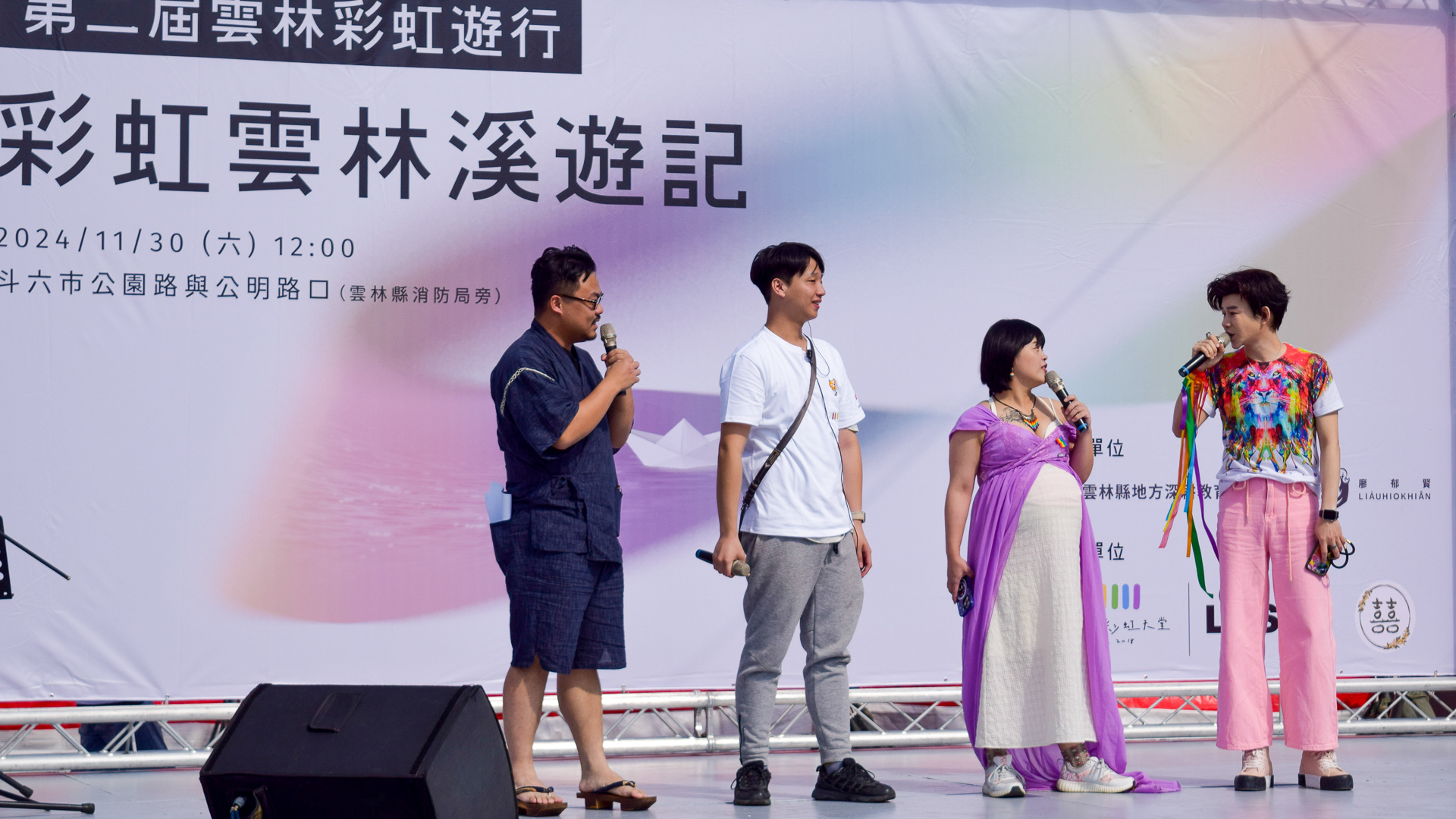
When I met An the week after Pride at yokocho152—the café in Beigang he renovated eight years ago and now runs with his husband—he was still dressed to the nines in a fitted, white button-down with two tiger heads embroidered across the chest, and plaid pants. He sat up straight throughout our entire five-hour conversation, his eyes betraying a much more reflective and solemn manner as he contrasted life in Beigang to his experiences in Taiwan’s bigger cities.
“Here,” he said, pausing briefly as we sipped rose coffees, “I’ve lived some of the loneliest and most difficult years of my adult life.”
An moved to Beigang with no support system beyond his husband and his husband’s family. To avoid unwanted consequences for their café, An and his husband agreed to refer to one another in public as “uncle” and “nephew.” However, even that hasn’t stopped busybody neighbors from poking into their affairs. An described how one elderly woman always stops when she sees An’s husband and, with a classic grandmotherly tone, chastises him for “setting a bad example.”
“‘You’re not getting married,’ she says, ‘and now look at this nephew of yours—so handsome, yet he’s not getting married or finding a wife either,’” An said.
Such expressions may be well-meant. But for An, Liu and other LGBTQ+ people in Yunlin, they are a tired but persistent symptom of a society yet to embrace gender diversity. I learned that they are far from isolated or even culturally tinted acts of microaggression. Rather, they feed off Yunlin’s structural problems.
* * *
In some Yunlin towns, the only young people are migrant workers taking care of local elders, an NFU professor named Lee Yu-hsi told me. “The out-migration is a personal issue for Yunlin elders as its visual imprint runs so deep,” he said.
The bespectacled, slightly hunched Lee had strolled to our meeting at the sleepy Louisa Coffee on NFU’s campus with a sharp tongue and a shopping trolley full of class supplies. In addition to regularly teaching an undergraduate course called “Gender and Law,” he sits on NFU’s Gender Equity Education Committee, a voluntary council formed in response to a mandate of the National Gender Equity Education Act, mostly to handle cases of sexual harassment or assault. He regularly delivers lectures on gender and LGBTQ+ issues across central and southern Taiwan.
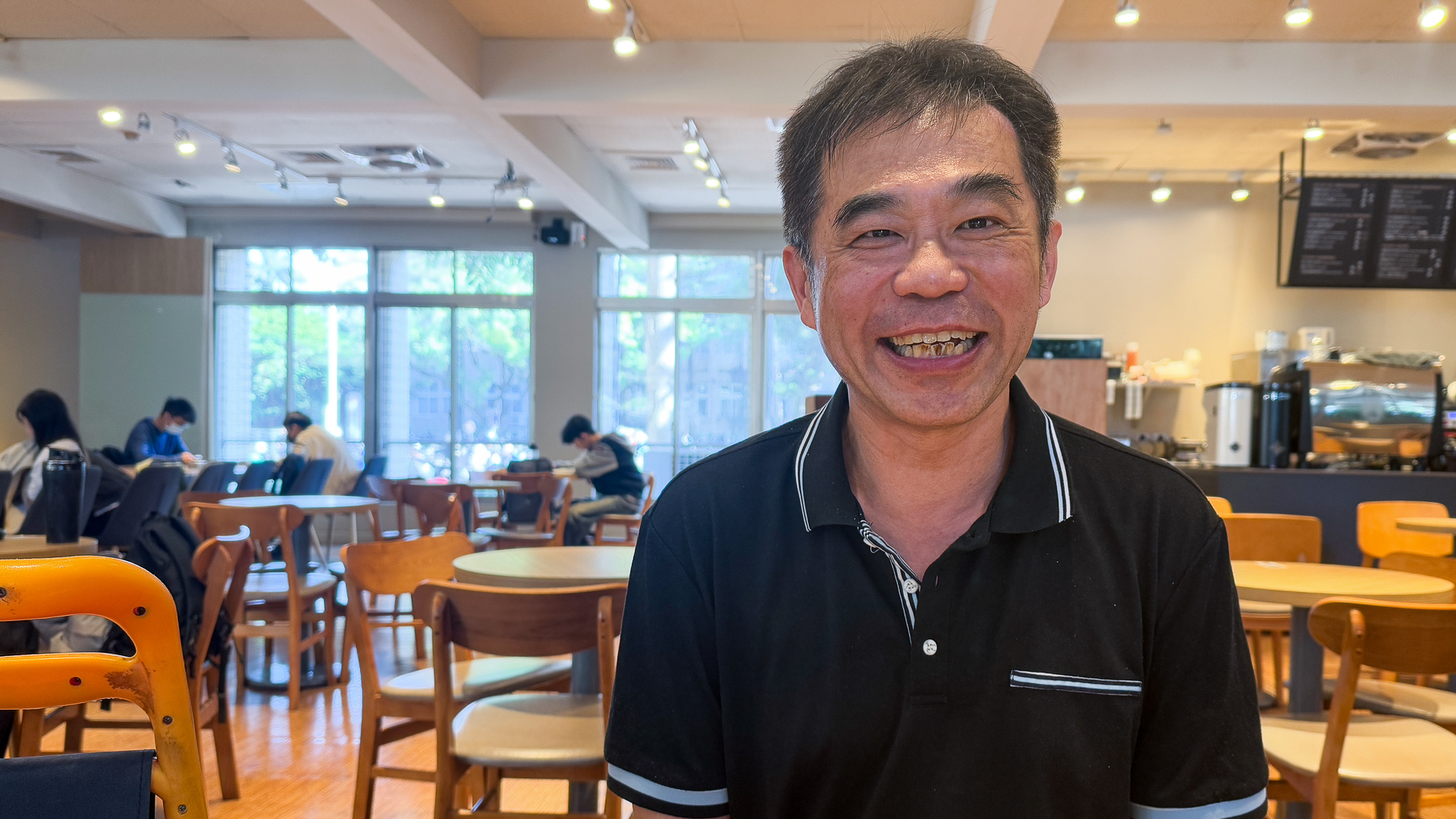
The out-migration of Yunlin’s youth has created the foundation for attacks on LGBTQ+ people across the county, Lee explained. As I’ve previously written, LGBTQ+ issues have been seen as “ballot-box poison” in Taiwanese politics since the late 2010s, in that any candidate who supports same-sex marriage must respond to banners held up across the county announcing that “Taiwan’s birth-rate decline is [LGBTQ people’s] fault” or “Same-sex marriage will lead to the extinction of our future.”
That is especially true in Yunlin. Such banners, largely deployed by the Chinese Nationalist Party (KMT) to target candidates of the Democratic Progressive Party (DPP), resonate deeply with Yunlin’s elders, fueling fears that same-sex couples further contribute to the end of their family lineages and hometowns. Indeed, during their campaigns ahead of general elections in 2024, some KMT candidates ran on platforms calling for the repeal of same-sex marriage entirely, arguing that such ideas pervert their children’s minds.
“We know that these slogans are fodder for political confrontations rather than true attacks on same-sex marriage,” Lee said. Beyond the few weeks of electioneering every two years, that kind of explicitly homophobic rhetoric rarely surfaces. “But it still weakens the government’s commitment to LGBTQ+ people, who continue to become collateral damage.”
Local legislators and bureaucrats remain hesitant to support LGBTQ+ rights. When former county legislator Liau Hiok-hian lost her 2022 reelection campaign after serving a four-year team on the Yunlin County Council, many anecdotally attributed her defeat to her decision to organize the first Yunlin Pride in 2020. She had also championed the creation of gender-neutral bathrooms across Douliu’s government offices and advocated for the destigmatization of HIV and Mpox. She even led an effort to establish an LGBTQ-friendly business district in Douliu like the Red House in Taipei.
“But once Liau lost reelection, all these efforts evaporated,” Liu said. “Many legislators even demonstratively converted their bathrooms back into gender-segregated ones.”
While two government bodies—the Gender Equality and Family Education committees—manage gender-related issues on a county level, as mandated by national-level policy, their influence and priorities ebb and flow depending on who is in power. Yunlin’s Gender Equality Committee focuses on gender parity between men and women, with recent meeting notes largely lacking any references to policies or programs in support of LGBTQ+ issues. Leo Chen, a Yunlin native and advocacy and digital communications specialist at the Taiwan Equality Campaign, is the committee’s sole “gender diversity representative” out of 10 governmental and eight other non-governmental members.
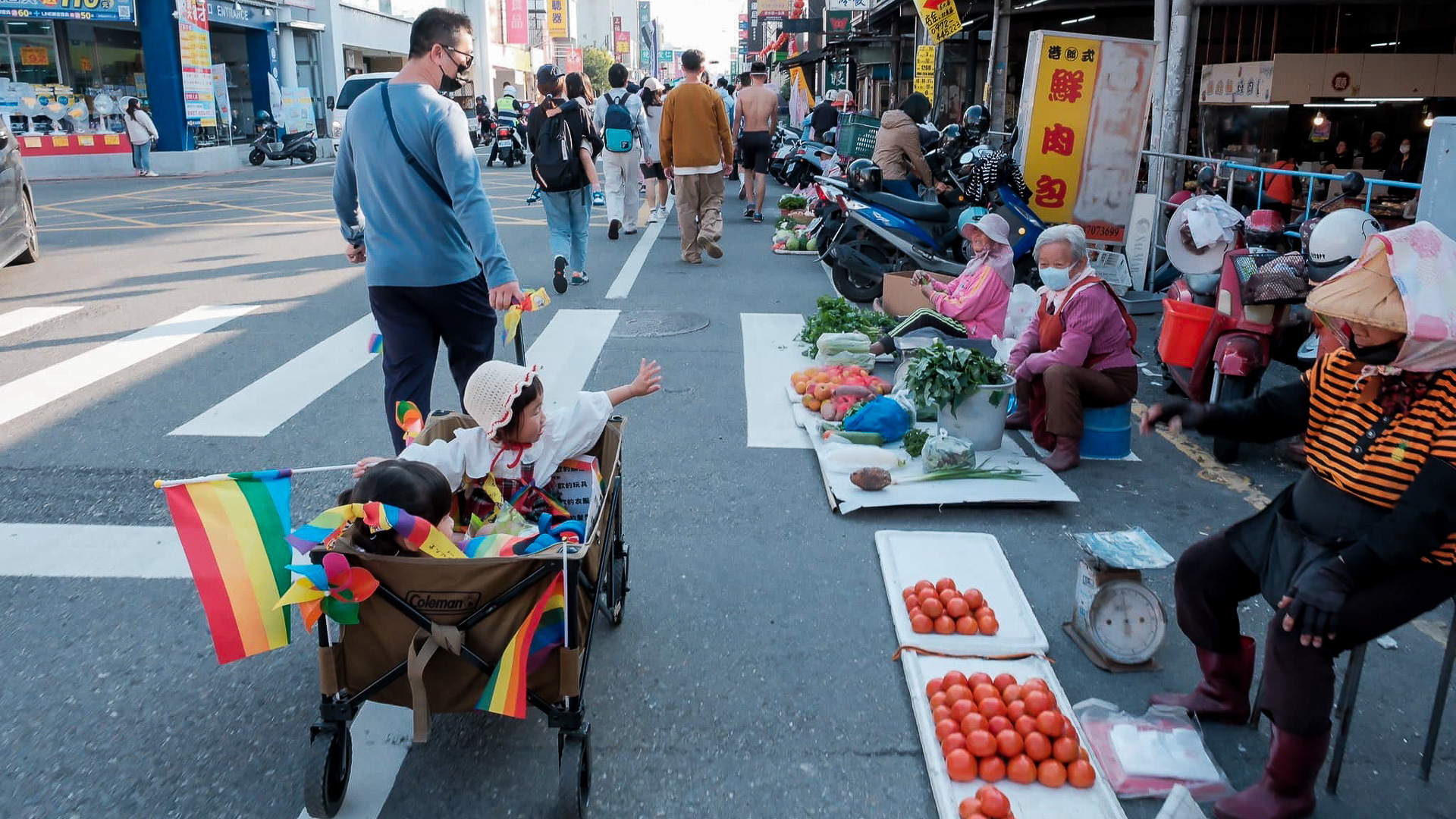
Outside the university context, Lee sits on Yunlin’s Family Education Committee and is also a government-approved speaker and public educator on gender equality and family education across Taiwan’s central region, often delivering lectures and seminars in Yunlin, Chiayi and Nantou counties.
The Education Ministry’s Family Education Act was expanded in 2020 so that locally administered family education centers must include LGBTQ+ and gender diversity as part of their public outreach efforts. Although LGBTQ+ issues are rarely foregrounded as the main topic of these seminars, as determined by the Education Ministry, Lee and other speakers are not prevented from including relevant materials in their discussions. Lee delivers about 12 lectures a year at schools, community centers, retirement homes, military bases, police academies and other spaces—when he often attempts to normalize LGBTQ+ identities.
Liao’s reelection defeat led to the elimination of the gender diversity programs she promoted, he said. Hierarchy and influence determine the progress of LGBTQ+ inclusion in Yunlin rather than any intrinsic belief in it—and the current power structure, without the influence of younger voices who left Yunlin for more stable futures elsewhere, has little investment in gender diversity. The environment made picking up Liau’s mantle from the first Yunlin Pride in 2020 an act of self-sabotage.
“It’s precisely because of this opposition and these challenges that we must hold this event,” Liu said when I asked him about his team’s goal for Pride. “We want to let everyone know that in Yunlin, there is a collective of people—hometown locals as well as people from all around Taiwan and even the world—who are willing to actively stand up and support LGBTQ+ issues.”
* * *
A week before 2024 Yunlin Pride, I traveled down to Douliu to shadow a volunteer onboarding meeting at the local DPP headquarters.
“Does anyone want to guess how old I am?” Liu expectantly asked a multigenerational group of 25 quiet volunteers, scanning quickly to see if anyone would take the bait. “Everyone’s always surprised when they find out.”
In the background, his friends and fellow organizers—mostly lanky and bespectacled college-aged youths—fiddled with the buttons of a projector. After five minutes, they let out a yelp of joy when it finally turned on.
“Fine, y’all are saved by the projector!” Liu said with a smirk as he projected a volunteer guide onto the wall behind him. “Hold onto your guesses—I’ll ask everyone again at the end.”
Liu and his friends continued to crack jokes between detailed breakdowns of volunteer tasks and itineraries, at one point playfully simulating what volunteers should do in a medical emergency. From Liu’s use of the platform HackMD to host the volunteer guide because of its mobile-friendly design to his very detailed focus on volunteer and participant safety during the parade, I never would have guessed that he was still a teenager—or that the Pride he was organizing would be the first one he had ever attended. Unlike most of the Pride celebrations in Taiwan, which are all headed by organizations that center their work around an annual Pride parade, Yunlin Pride is one of many projects led by YECA, which Liu founded last year to promote local pride and awareness in the county.
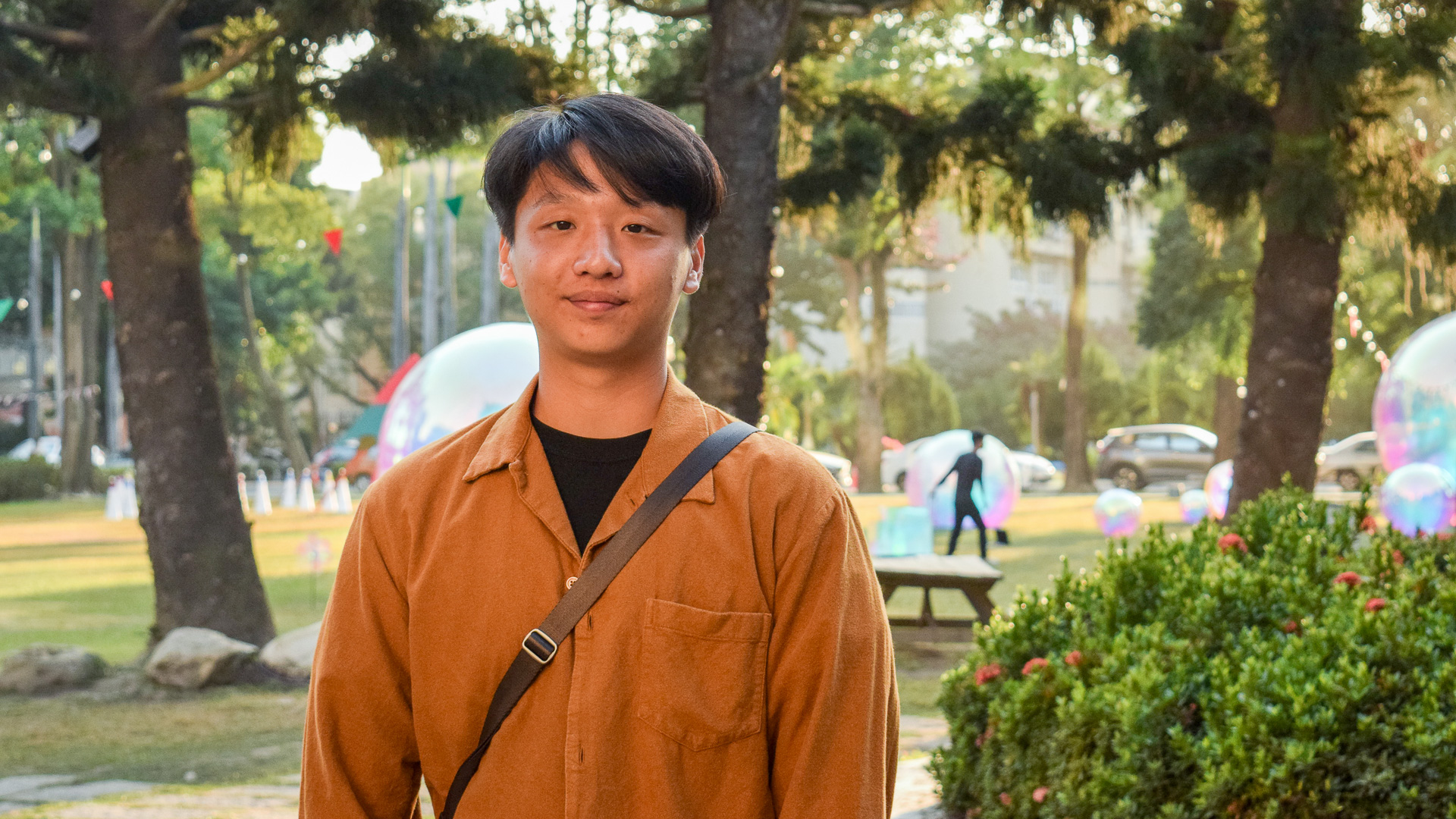
“One of our initial hopes was to showcase more of Yunlin’s agricultural and religious products into our festival market, to further enrich a sense of local pride,” Liu said. “But we were caught up in so many delays and problems.”
Indeed, beyond the venue struggle with county officials, Liu faced another institutional obstacle: his own university.
Following early expressions of support from NFU President Chang Shinn-Liang, Liu and his team sent out a survey to gauge student and staff interest in the parade in order to determine how much funding the university could offer. The poll was well-received, with over 50 individual and eight organizational responses.
Quickly, though, several homophobic posts emerged on DCard, an anonymous bulletin-board forum with a large student user base. One thread even claimed that the Pride organizers were abusing the school’s name to source volunteers, which eventually caught the university’s attention and forced an official reply.
“In the end, the school claimed there wasn’t enough funding available and that we had used its name in a way that could harm its reputation,” Liu said.
The impacts of the university administration’s about-face rippled outward. A dance therapist and NFU student counselor named Tsai Pei-shan was an early supporter of Liu and his Pride organizing team. Hired in 2004 after the passage of the Gender Equity Education Act, Tsai has been an important voice for LGBTQ+ students on campus, organizing seminars, an art and photography exhibition and private support groups for LGBTQ+ students over the last 10 years.
Before the university denied funding to the Pride team, she had hoped to use the Student Counselling Center’s name to help Liu request additional subsidies from the Yunlin Public Health Bureau. If the university was willing to put its name on the funding application, the Public Health Bureau would have been more likely to consider the request. However, once the university completely pulled out of supporting Pride, Tsai was blocked from further action as well.
“‘We respect LGBTQ+ people, but don’t ask for anything more’—that’s the university’s position,” Tsai said, emphasizing that her funding from the Education Ministry to promote gender-equity education on campus is “so low that it can’t go any lower.” She deeply empathized with the Yunlin Pride team’s struggles after it abruptly lost funding from both the government and university.
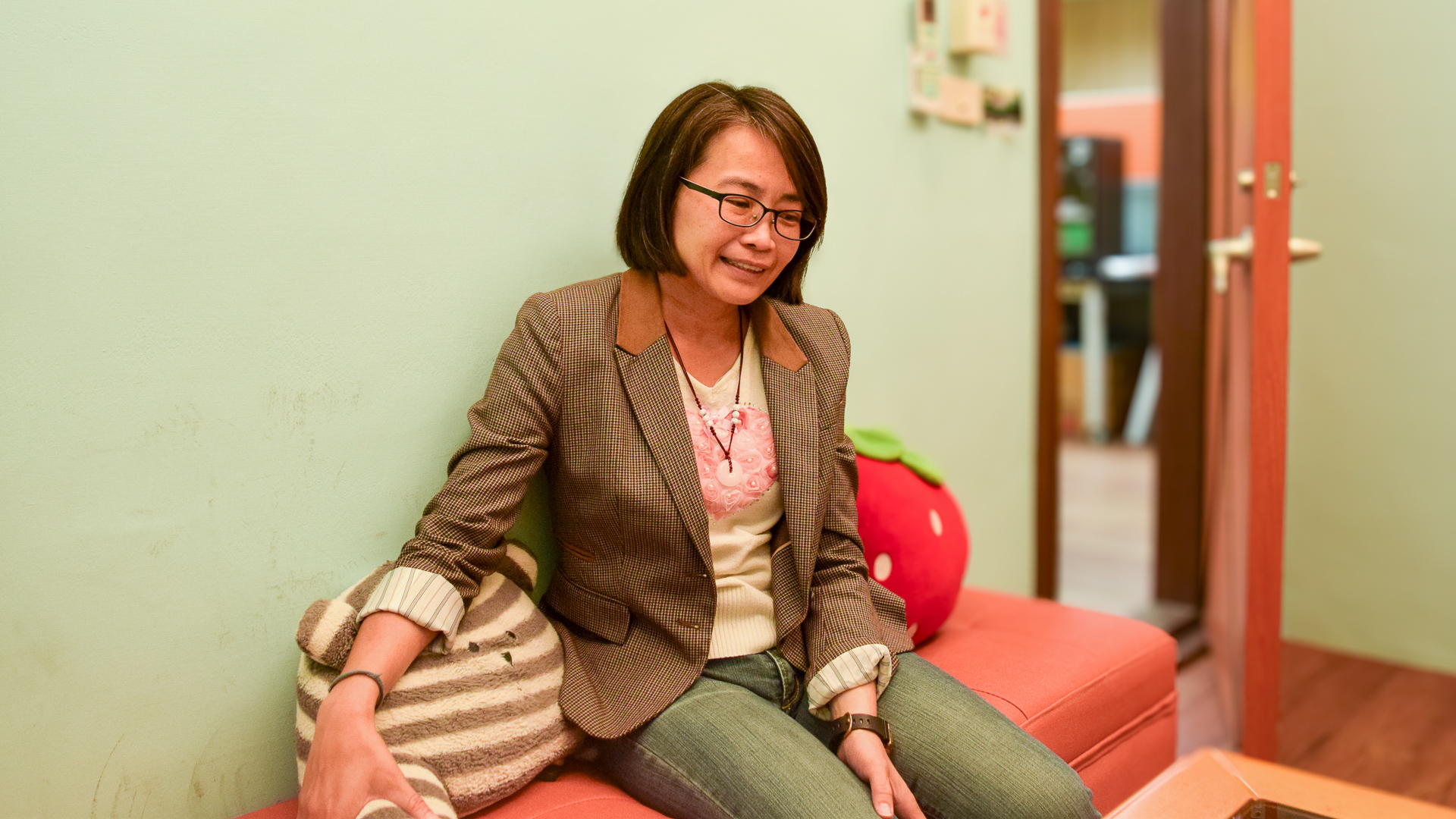
Before I spoke with Lee, Tsai and Liu—all affiliated with NFU—I had assumed that a university campus might be a bit of a haven for LGBTQ+ students. Some of Taiwan’s earlier LGBTQ+ advocacy organizations sprouted from student organizations at National Taiwan University and National Taiwan Normal University in Taipei, many of which continue rich traditions of student activism. But here in Yunlin, where campus administrations and student bodies are equally avoidant of LGBTQ+ issues, queer students are often pushed deeper into the closet.
Both Lee and Tsai were hesitant to put faith in campus Gender Equity Education committees, particularly those that investigate cases of sexual harassment and abuse. Lee and Tsai gave me an anonymized account of a case last year in which a gay male student was accused of sexual harassment by a straight male classmate after the former touched the latter’s head. While no action was ultimately taken against the gay student, Tsai mentioned that such incidents make it even more difficult for LGBTQ+ students to stand up and report incidents.
“A lot of people on the NFU campus will say they respect LGBTQ+ people but continue to crack jokes and make discriminatory comments. That’s not real support,” Tsai said. “If I ever had a situation between two LGBTQ+ students, for example, I would be worried to bring it before a [Gender Equity Education] investigative committee for fear of the discourse it would start on campus.”
A campus of some 10,000 students with a male-female gender ratio of 7:3, NFU does not have any LGBTQ+ student organizations. By contrast, Lee noted, “on many campuses in Taiwan’s southern and central region, religious student organizations can have an outsized presence.” Here, conservative Christian values and family-oriented Confucian values become bedfellows in opposition to queer voices.
In the classroom and among student-organized events, the extent to which LGBTQ+ students are subject to their straight classmates’ ignorance largely depends on their departments and faculty. When Lee surveyed his students at the start of one “Gender and Law” course, a student replied that he opposed LGBTQ+ rights because he was worried his girlfriend would leave him after watching lesbian porn. When Liu draped a rainbow flag over the backdrop of the drag queen Yvonne Ilha Formosa’s performance during NFU’s 44th anniversary, he overheard multiple students wondering if the banner had any particular meaning.
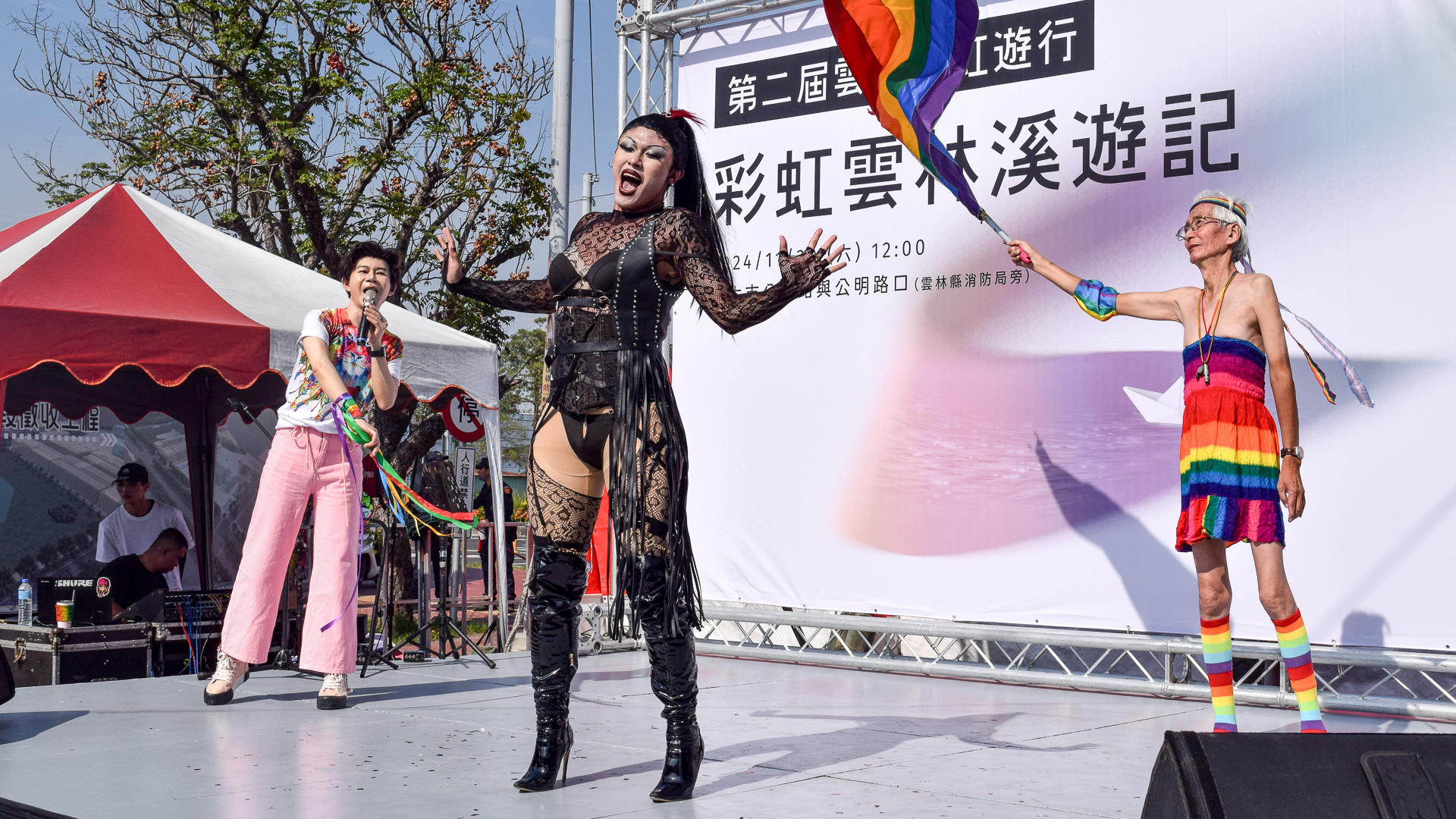
“Having been here for almost five years, I don’t expect Yunlin students to stand up and support LGBTQ+ issues but I am surprised by how little some people know,” Liu said, nodding empathetically at my expressed bewilderment. Indeed, despite the efforts of staff such as Tsai and Lee—whose reach rarely extends beyond their counseling offices and classrooms—LGBTQ+ students find themselves on a campus disciplined by the same hierarchical, patriarchal values that preside over the county as a whole. Even the purported accountability measures, such as the committees, are limited in funding and influence, fulfilling policy requirements rather than focusing on students’ needs.
Whenever I talked to any LGBTQ+ person or ally in Yunlin, whether they had attended Pride or not, they all had a similar reaction: “They’ve gone through great hardship.”
* * *
When the 2024 Yunlin Pride festival and parade kicked off just after noon with a lip-sync performance by the drag queen Spicy Mazu, I could count on two hands those who congregated near the stage. In between shutter shots, as I scurried left and right with both my camera and iPhone in hand, I tried to join the small chorus of applause from Spicy Mazu’s friends who had driven down together from Taipei to support her performance. A noticeable chasm away from us, a few couples and masked individuals shyly stood, politely swaying to the drag queen’s rendition of the 1990s Taiwanese pop classic “Love Cha-Cha” (Ai Qing Qia Qia) in slim patches of tree shade.
Behind them, across the short street block reserved for the festival that was lined with vendors selling rainbow paraphernalia and Pride-themed refreshments, each person stood out against the bare concrete, their distinct shadows doubling the crowd count.
Spicy Mazu held her right hand over her eyes and scanned the crowd: “Loved one, where did you go, I want to dance the cha-cha with you!” She two-stepped to the edge of the raised platform, smiling through glittery eyeliner and teal tassels dangling from her regal headdress to beckon to the small crowd. As she continued to twirl her fingers, I turned around and saw a woman with a rainbow flag draped around her crop top reaching back to her with longing sentimentality.
The loneliness of the Yunlin LGBTQ+ experience was being bridged.
“Some people may know that Spicy Mazu is from Yunlin. How amazing is it that we can see a local drag queen so beautifully representing local Yunlin culture?” emcee An exclaimed from the side, setting off the gentlest of woos as a smirking Spicy Mazu transitioned into her second lip sync: an electronic dance remix of another Taiwanese diva classic, “Beyond Love” (Ai Jia Chao Guo).
Both on- and offstage, in and out of drag, Spicy Mazu (whose boy name is Wu Po-Sung) moves with voluminous and steady self-assurance. Her drag name is inspired by a religious robe charred with incense, which she had acquired from a Mazu temple that honors the eponymous Taoist sea goddess and Taiwan’s most prominent female deity. Before emulating the goddess’s appearance in a performance, she always goes to a Mazu temple in Taipei, where she now lives, to receive Mazu’s blessing. But in slight contrast to her name, Spicy Mazu slinks with a majestic, unflappable coolness. Whether in lip sync or speech, she does not exaggeratedly open her mouth or allow her features to twitch unnecessarily.
At the core of her drag is a celebration of Mazu and local culture. Not only does Spicy Mazu primarily perform songs in Taiwanese Hokkien—“My English isn’t good, so I can’t do the pop diva songs that all the other queens do anyway,” she said—but she also incorporates some element of traditional culture through her fashion choices.
During Taipei and Kaohsiung Pride in 2020, the year after same-sex marriage was legalized, she created a dress that looked like a traditional wedding banquet table, complete with traditional ornaments and plastic food items, to wish all her friends well with their marriages. During a mid-autumn festival performance, she slowly unwrapped a headscarf to reveal a wig made from round mooncakes plastered onto a bald cap. A secondhand clothing store manager when not in drag, Spicy Mazu sources and creates the outfits herself or with the help of her two drag daughters.
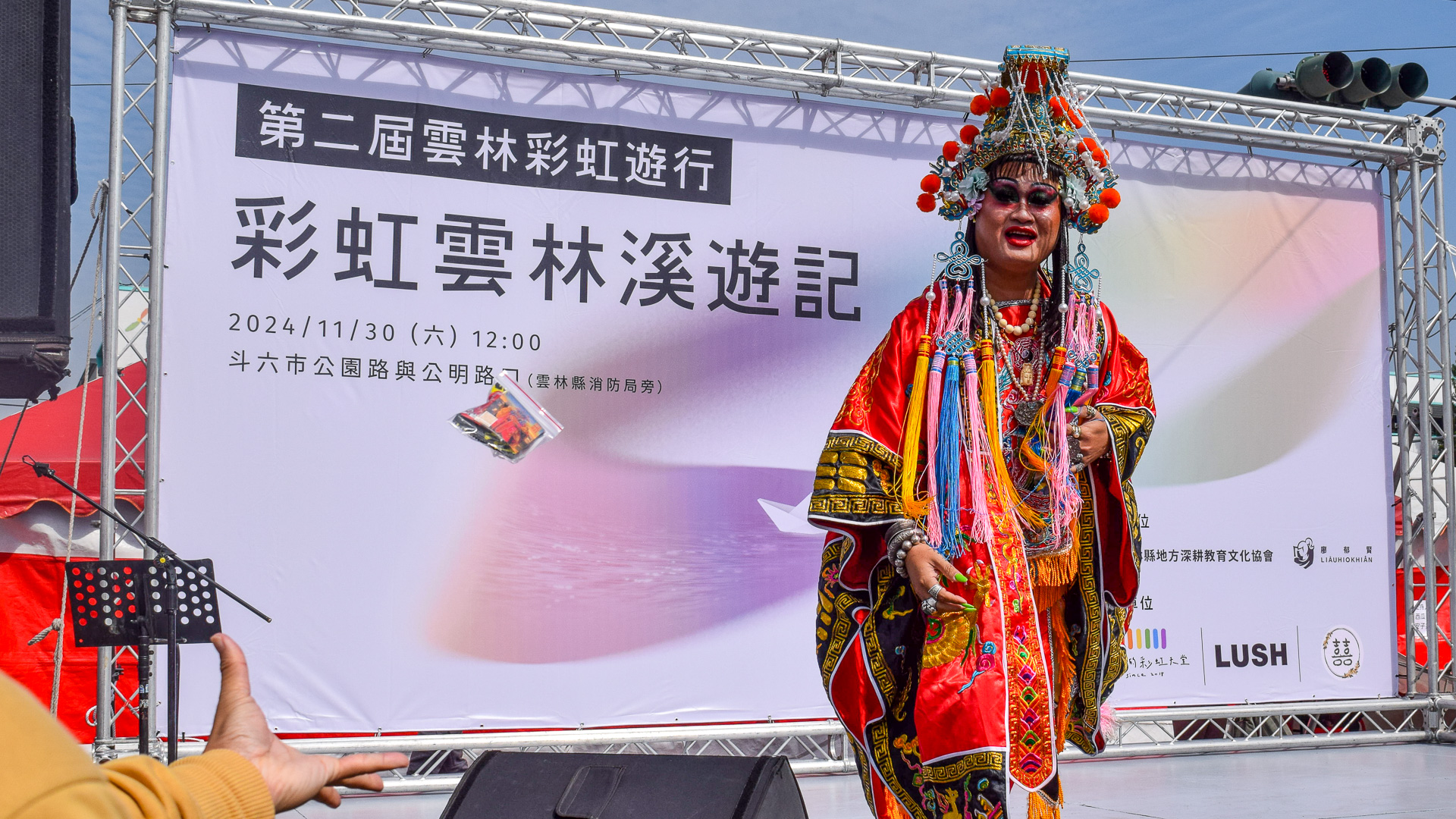
“To see pairs of men walk the entire length of the Pride parade, holding hands, unbothered by the looks of their elders on the sides of the streets—in a small, small place like Yunlin, that’s huge,” Wu said as we chatted over coffee in Taipei the following weekend.
While the drag queen Yvonne Ilha Formosa skidded across the stage to Britney Spears’s “Toxic” and then dramatically lip-synced to the legendary Taiwanese diva Ah-mei’s “Rainbow,” the first openly gay Taiwanese man, Chi Chia-Wei, appeared onstage behind her. Dressed in the trademark all-rainbow off-shoulder pencil skirt that he wears to every Pride, he waved a rainbow flag that could wrap around his entire body.
“Yunlin is part of Taiwan, so Yunlin should have equity for LGBTQ+ people too!” the 66-year-old Chi said before he was helped off the stage by the emcees. International Transformative Diva Deng Bai-bai brought the performances to a close with two captivating personas, including a female twist on the religious figure Monkey King, inspired by Yunlin’s rich tradition of glove puppetry.
By around 2 p.m., with minimal delay, the 2024 Yunlin Pride parade officially set off. While the van started down the wrong road—sending Liu to chase after it with one arm waving frantically and the other tightly grasping the black headset bouncing around his neck—the rest of the two-hour procession progressed smoothly under the warm autumn sun.
In many ways, it felt like other Pride parades. Signs were made and waved. A topless woman offered free hugs as she advocated “free the nipples.” Organizations, performers and emcees climbed onto the parade van one after the other, giving speeches about why they came out to march. Kids climbed in and out of strollers pushed by their parents, representing the Taiwan Obasang Political Equality Party. A pair of gay fathers in matching white shirts and beige shorts walked with their small daughter, who alternated between sitting atop and inside a jade-green, box-shaped stroller, even inviting other children to join her. A few store workers waved back at the relaxed crowd: baristas at a bubble tea shop and real estate agents from their office. I saw one woman roll up her car window, whether disturbed by the noise or the parade’s message I couldn’t tell. Oncoming traffic—regulated by volunteers in traffic vests with whistles dangling around their necks—moved along as it might on any other Saturday afternoon.
Slogans were chanted and repeated, calling for the arrival of true gender equality in Yunlin. But unlike the “Love is love” terminology or calls for sexual freedom common at other Pride parades, the organizers of Yunlin Pride demanded respect, resources and public space—the social conditions necessary for love to be found. More than I’ve noticed in Taipei or Kaohsiung Pride, there was a concerted effort to also build dialogue on the streets, directly speaking to passersby on a regular basis.
Emcees regularly switched between Mandarin Chinese and Taiwanese Hokkien to proclaim: “We are Yunlin Pride! We are walking today to support gender equity because everyone deserves to be treated with respect.”
At a wet market in the center of Douliu, I watched as a middle-aged woman stopped deboning a chicken to observe the procession. At first, her expression was still. She scanned the sea of rainbow ribbons with a focused squint that twitched perhaps with confusion, perhaps curiosity. But as the emcees continued to introduce the parade in Taiwanese Hokkien, her eyes lingered the longest of the wet-market vendors and shoppers. Old aunties, bundled in down jackets despite the warm sun, barely looked up from the vegetables strewn across their threadbare picnic blankets. Cooks continued to hose down their metal workstations and tiled floors, eager to close shop. A few old men hastily shuffled their feet in the opposite direction, pink plastic bags swinging at their sides.
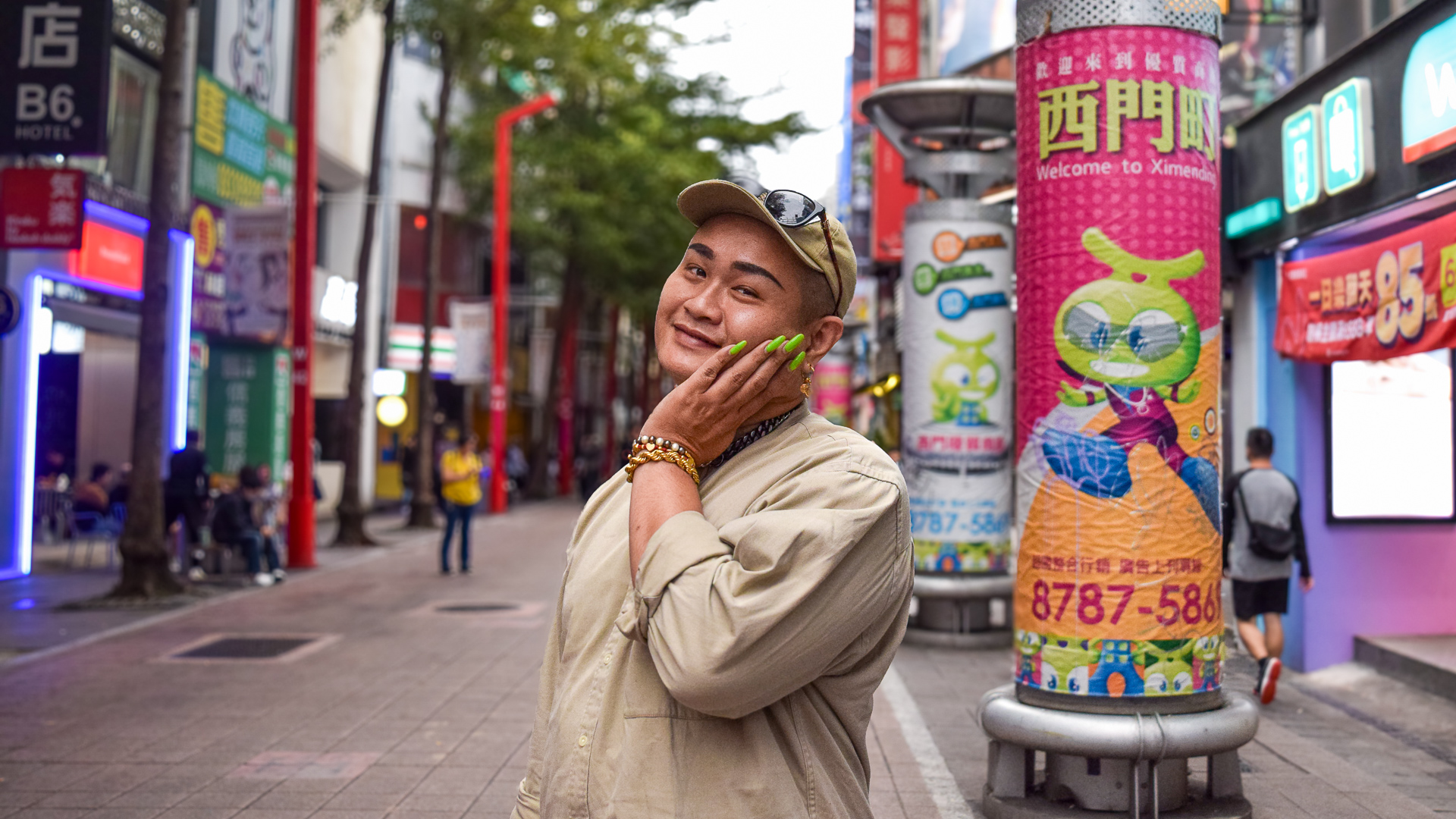
But for the few minutes it took us—this unhurried crowd of a few thousand LGBTQ+ people and allies—to pass the market, the woman put down her butcher knife, her gaze following the parade van. I saw a gentle smile creep across her face as she got back to work. Lee later told me that through his seminars and lectures around Yunlin, he’s learned that local elders tend to harbor no ill will or negative feelings toward queer people.
“No one has tried to communicate earnestly with them about LGBTQ+ issues or people,” he said. In particular, Lee noted that the difference between communicating with elders in Mandarin and Hokkien is vast, with the latter able to establish an instant feeling of familiarity.
As the parade wrapped around back toward its starting point, I saw another elderly woman seated with a care worker at the edge of the adjoining park. Her lavender down jacket and white shawl made my tank top, ever so slightly revealing my midriff, feel entirely out of place. But her face creased as her smile followed the parade. She turned her head from the left to the right to observe the incoming batch of marchers. As I passed by her on the way to the public bathroom, she waved her hand at me and, in Taiwanese Hokkien, said: “Gaa Yiu!” (Keep going!) In my broken Hokkien, I thanked her and asked if she knew any LGBTQ+ people. She took my hands in a cold grasp and told me her daughter is a lesbian and her biggest regret was that she could not support her more in the process of coming out to the world.
My comprehension of her Hokkien eventually devolved and I nodded and affirmed as the elder continued to speak. But before I left her, I passed the rainbow banner from my wrist to hers.
“Quick, take a picture of this for my daughter,” I heard her tell her caretaker as we waved goodbye.
At the beginning of the day, Pride felt like a family affair where estranged relatives realized for the first time just how large their community—nebulously bound together by their shared expertise in hiding from one another and everyone else—really is. If only for a few hours, Pride created an oasis within this gay desert, a place where LGBTQ+ people in Yunlin could belong and delight in a more honest gender expression. Perhaps beyond the drag queens who played with gender fluidity in the context of local customs, this Pride was neither carnivalesque nor very campy—but I didn’t mind. The orderly march through Douliu seemed to step in closer beat to the rest of the Yunlin society.
Some may critique such orderliness as a form of respectability—of craving normalcy and buying into homonormative values. As I walked beside the 4,500 other participants, however, I heard them debate the progress of artificial reproductive rights for LGBTQ+ people in Taiwan and discuss the educational environments of their respective college campuses. Emcees and speakers called out politicians by name and office for allowing homophobic discourse to fester. Politics were never far from their minds, but all were in favor of co-creating a better Yunlin, a better Taiwan.
In a county where fear has bred silence around issues of gender diversity even five years after the passage of marriage equality, Yunlin Pride let local LGBTQ+ people know that they can safely walk in the sun, shout their discontent at the government and excavate pockets of support with even the unlikeliest of allies.
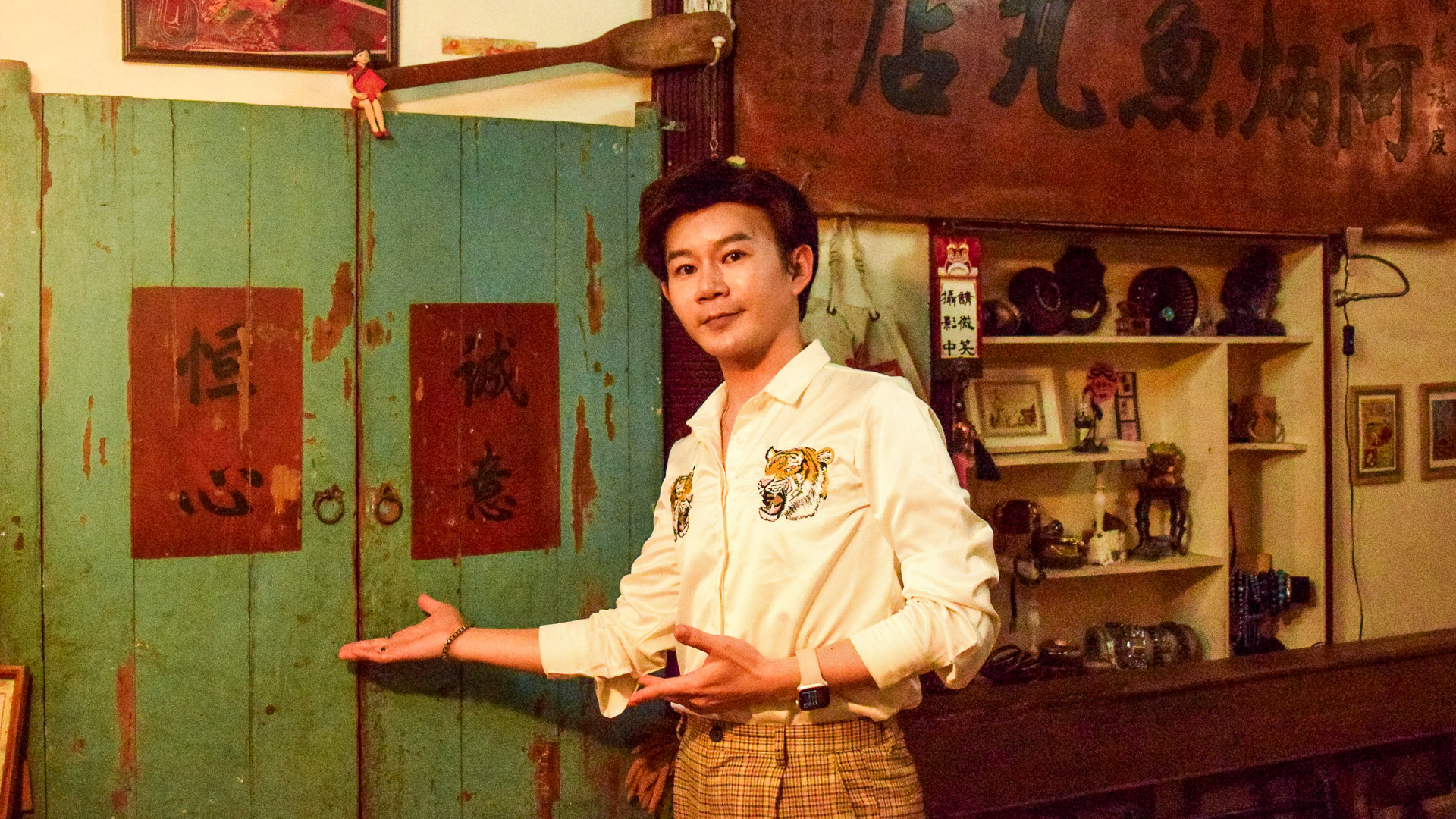
Walking down the paved alleys of Beigang, a town where lush potted plants and motorcycles stand where sidewalks might be expected, I first encountered An and his husband’s dog in the street, a 2024 Yunlin Pride banner swinging from her neck with each step. She ran around my feet as I approached the yokocho152 café, as though guiding me to my interviewee for the afternoon.
The establishment is a museum of Beigang’s past as well as the family history of An’s husband. When the two decided to open the business eight years ago, they also assumed responsibility for refurbishing the space. And their deep love for it sings through every item on display. They fashioned tables and cabinets from the house’s old windows and beams. Signs and menus from An’s father-in-law’s old workplaces—from street stalls to Japanese hotels—adorn the walls. Antique jewelry and crystals catch glints of afternoon light from the shelves, which were also crafted from recycled wooden furniture decorated in older Chinese patterns. An’s descriptions of the loneliness and mental health crises he endured while living in Beigang struck me even more powerfully after seeing how much he had invested in this space.
An had developed a steely armor of resilience throughout his life. When he was growing up in Lukang in nearby Changhua County, the word “gay” was not even in the public consciousness, he said; homosexuality was associated purely with perversion and moral disgust. By leaving home for university in Taipei and then living in Vancouver, Hong Kong and Taiwan’s other major cities, An was exposed to both the possibilities of queer acceptance as well as the pressures of working as a gay radio and event host. He won awards for the radio and emcee work that also pushed him to undergo plastic surgery and suffer intense diets. But when he first returned to Beigang, he said, hopelessness had infected his worldview as though he had regressed to his childhood self in the villages of central Taiwan.
“This is not the life I imagined for myself at this point,” he told me, pausing as his dog hobbled back in from the street.
However, after returning from Pride, An said his outlook on Beigang had changed. While the lack of privacy and gender awareness is undeniable, Yunlin Pride helped him realize that “what I once thought of as a remote, completely overlooked place is indeed full of people who deeply care and fight for one another,” he said. “Because I didn’t give Beigang a chance, discriminating against the place as a forgettable village, Beigang didn’t give me a chance to thrive.”
“After all discrimination is just a defense mechanism from our fear of the unknown,” he added.
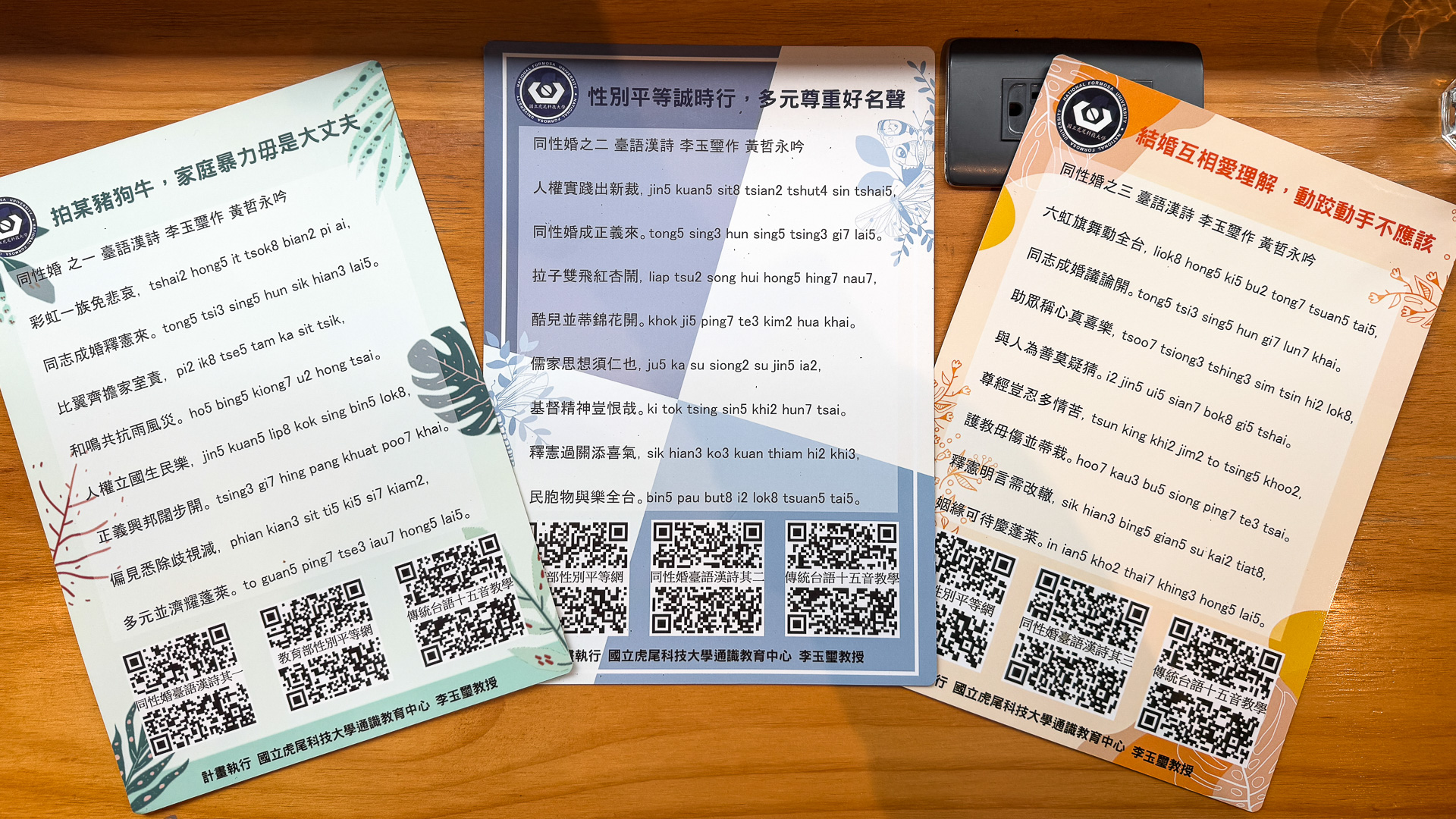
In the background, An’s husband quietly watched videos on his phone. He occasionally came over to refill our water glasses and by the fourth hour of our conversation, he offered to buy steamed buns as an afternoon tea break. An said his husband is a very private person. “Going to Pride together, even agreeing to this interview, has been a way to test our growth, our limits, our mutual ability to compromise,” he explained.
Framed as such, An and his husband’s relationship feels similar to the role of Pride in a society on a path toward gender equality. An related that signing the marriage registration paper was the easiest part of their marriage; the work of nurturing their long-term relationship has been much more difficult and meaningful. For its organizers and participants, 2024 Yunlin Pride affirmed that communal care can’t be overlooked, especially in Taiwan’s less populated and progressive regions, even if marriage equality is signed into law.
Outside Pride, the work is continuing as well. On NFU’s campus, Tsai continues to host LGBTQ+ group meetings on an ad hoc basis. She told me how two transgender students were able to find one another through the support of the Student Counselling Center, not only providing mutual support in the face of deep mental health struggles but even inspiring other non-transgender LGBTQ+ students with their fortitude.
Lee said that many of Tsai’s efforts at the Student Counselling Center have created meaningful, gradual shifts on NFU’s campus. “Living Library” sessions where LGBTQ+ people share their life stories have brought more color and representation to LGBTQ+ issues to the university. In 2019, with funding from the campus’s Arts Center, Tsai also spearheaded a photography exhibit titled “Capturing the Rainbow in Our Hearts” that highlighted LGBTQ+ stories across Taiwan and received positive feedback.
“Seeing this many people step up to advocate for gender equity, I’m filled with emotion,” one review noted.
In the community, Lee has developed gender equity education materials in Taiwanese Hokkien, not only to use in his seminars but also to help younger generations learn the requisite vocabulary to talk to their elders—a strategy he continually espoused in our conversation. He gave me three poems he had written, with audio accompaniments on YouTube, that describe the LGBTQ+ experience during and after the marriage equality fight. Lee emphasized that the materials were born from his own exasperation over the lack of non-academic, publicly accessible materials for community education.
Much of the LGBTQ+ advocacy in this desert of advocacy attention continues to be driven by individual efforts. Last year’s Pride was no exception. When I asked Liu what was on his mind with Pride now past him, he replied bluntly: “Where to find 100,000 New Taiwan Dollars (NTD).”
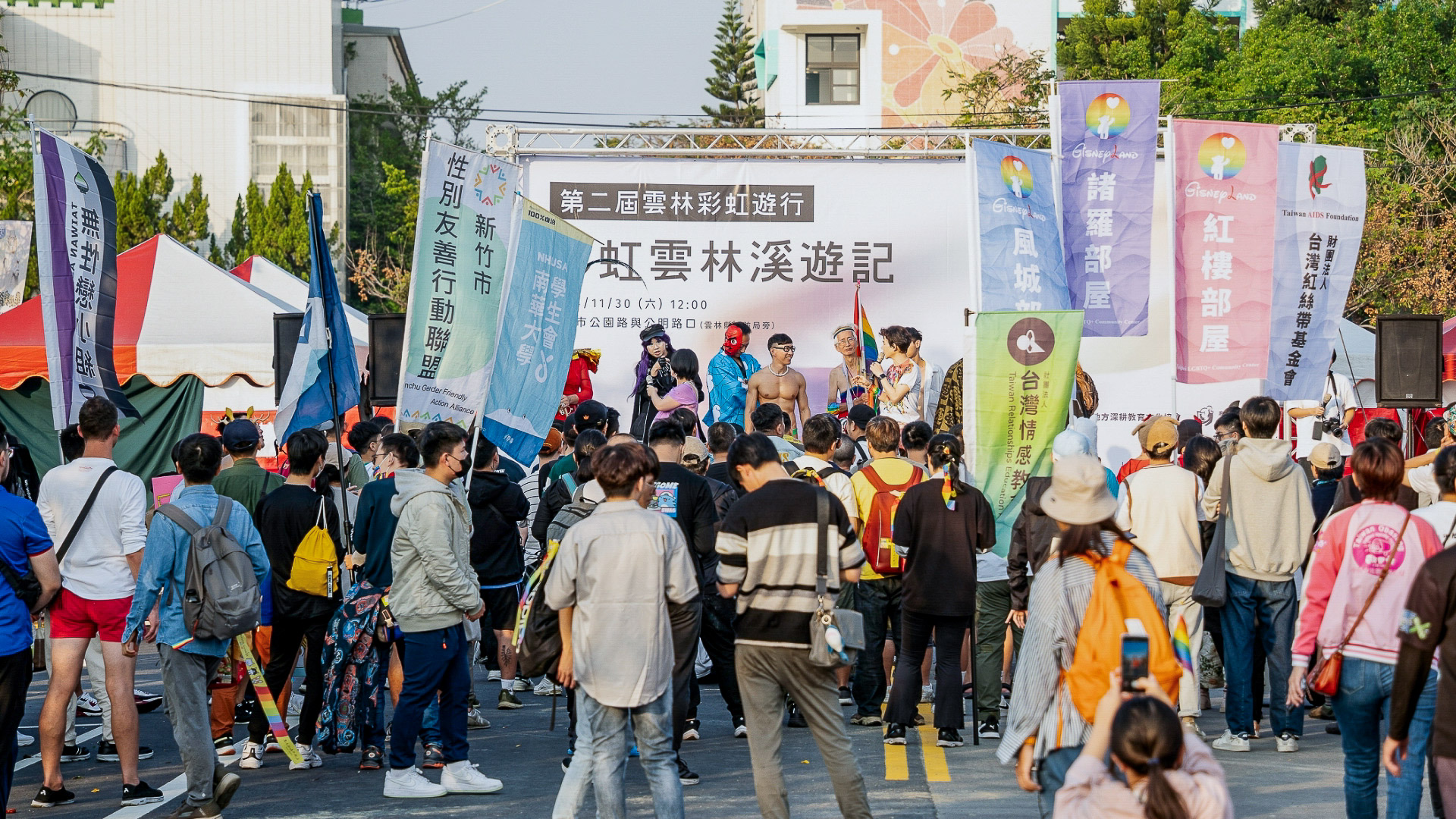
Without the financial support of the university or government, Liu personally paid for a number of the event’s expenses, including all the hardware, parade van, publicity banners, insurance and volunteer meals—accumulating a debt of about $3,000 at the event’s conclusion. While YECA could have applied to receive donations under Taiwan’s Charity Fundraising Act, the team of students—already burdened by the venue search and the university’s reversal of support—could not complete the bureaucratic processes required.
Yet when I asked Liu if he would do it all again—if he would still step up as the lead coordinator for the next Pride—he answered without missing a beat: “Yes.”
Liu’s commitment to this county—still wobbling on the initial waves of Taiwan’s LGBTQ+ movement—surprised me, not only by his swift answers (given that he is still 70,000 NTD in debt at time of publication) but also how adamantly he views Pride’s importance.
Every year, think pieces about the necessity of Pride flood Instagram feeds, wrestling back and forth about how much party and how much protest should be at Pride and questioning if the event is even for LGBTQ+ people anymore.
In an LGBTQ+ movement that has often used theatrics to push its agenda, the aesthetic staging and sonic cues of Pride now regularly fail to satisfy its own people. Yet in its stripped-down nature, Yunlin Pride was a discernable step toward demystifying Yunlin’s LGBTQ+ community to itself and the rest of society. Even without an immediate political crisis or catalyst, or the fanfare of a major corporate sponsor or rainbow-studded celebrity performance, the organizing team and its supporters created an event where queer people could revel in visibility: not so much in being seen but in seeing one another through the haze of their neighbors’ gazes, their politicians’ disregard, their elders’ ignorance.
“We need struggles that, to be frank, don’t rely on who or how we fuck,” journalist Sarah Jaffe writes in Dissent magazine. Indeed, the 2024 Yunlin Pride was rooted in identities as much as calling out the lack of attention and structural investment to support Yunlin County’s oft-forgotten population as a whole.
The 2024 Yunlin Pride came to a gradual end. People slowly trickled away once the parade ended. I saw one man, who had his shirt open to reveal a well-built chest for the entire procession, button up as he left, his head tucked down over his phone, alone.
The next steps are uncertain. Liu does not know when the next Pride will be, although his team is also thinking of organizing an event that would celebrate spirituality and gender diversity, after the Baishatun Mazu Pilgrimage and other vibrant religious activities in Yunlin. There are talks over collaborating with Taichung GDI and other nearby LGBTQ+ NGOs to create a physical space in Yunlin, with funding being the perpetual barrier.
But as people left, I heard them saying to one another with hopeful chuckles: “See you at next year’s Pride!” And to the people who are invested in these connections enough to linger or return, who have dispelled their belief that Yunlin is nothing more than a pitiful gay desert, I couldn’t help but say as well: “See you next time.”
Top photo: The Taiwan Obasang Political Equality Party was the only political organization to walk in the 2024 Yunlin Pride. The banner says: “Give the next generation a Taiwan with gender equity,” with a pun on the drag queen Nymphia Wind’s trademark banana look

